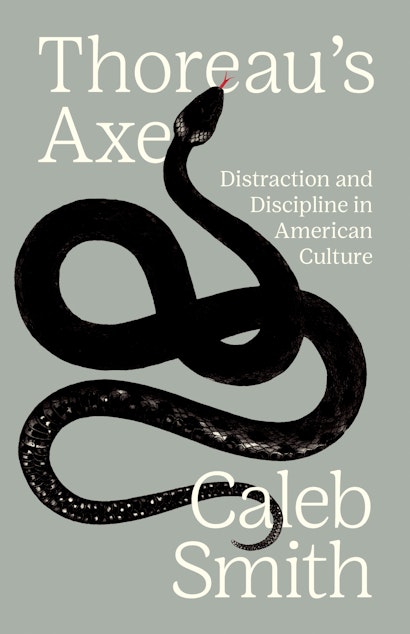In his early years, the writer and naturalist Henry David Thoreau was a restless young man with a romantic temperament, casting about for a way to make a living without giving up his freedom. At first, he thought that he might earn money picking berries, since working outside would require, as he put it in Walden (1854), “little distraction from my wonted moods.” Or maybe he could gather wild herbs and evergreens for sale in town.
In the end, though, the idea of doing even such light agricultural work for profit turned Thoreau off. He could not stand the idea of turning his beloved wild plants into commodities. In nineteenth-century New England’s industrializing economy, the traffic in consumer goods was getting busier every day. Thoreau saw buying and selling the fruits of the earth, not to mention other people’s labor, as a wicked business. “Trade curses everything it handles,” he declared.
And so it is curious to see Thoreau’s name and works conscripted nowadays for use in advertising, as commercial brands. From a Connecticut tea merchant, for instance, you can order a four-ounce tin of Henry David Thoreau’s Herbal Tisane Blend, a mix of apples, spearmint, and other ingredients mentioned in Thoreau’s writings. The promotional materials instruct shoppers to “imagine sitting at Walden Pond enjoying a quiet, peaceful moment with a cup of this caffeine-free tea.”
In the Walden videogame, available for Xbox, “players are surrounded by the beauty of the woods.” The program guides its users into a sojourn along the water’s edge. You have to survive, but your real mission is to find “inspiration.” Rather than an adventure, the game provides a virtual spiritual exercise.
“In the American imagination, Walden is the quintessential place of refuge,” according to the website of a Brooklyn-based design firm, known as Walden, whose products include a yoga mat and cushion set ($295) and a forest-scented aromatic mist ($68). The company’s founders define their “ethos” as a shared belief that “everyone needs a space of their own to reflect, be present, and find comfort.”
An herbal drink, an interactive meditation game, a yoga mat: what do these things have in common? When you purchase a Thoreau product, what are you being sold?
As I read through the advertisements, I am tempted to say that their emphasis is less on what the packages include than what they leave out. The tea has no caffeine. The game features hardly any action and no violence at all. In the online photos, the Walden bench sits alone in an otherwise empty room.
What you are buying, then, is less a physical object than an emotional or spiritual benefit. The advertisers call it by a few different names—refuge, quiet, being present. They are telling you that when you are alone, with Thoreau as your guide, you will achieve peaceful self-composure; you will find yourself detached from the hecticness of hyperactive work and entertainment. Your attention will be focused on what really matters. Thoreau products are therapies for people suffering from distraction.
Thoreau himself was deeply concerned about this modern ailment. “I believe that the mind can be permanently profaned by the habit of attending to trivial things,” he confessed. He worried that his era’s economic system was degrading the mental capacities of the people who worked and shopped in it. Their attention was all taken up by production during laboring hours and by consumption in the little bits of leisure time left over.
Thoreau committed much of his work to repairing the harm. He explained: “If we have thus desecrated ourselves,—as who has not?—the remedy will be by wariness and devotion to reconsecrate ourselves.” He saw distraction as a fallen state, but he hoped that people might redeem themselves. Thoreau’s program involved selling less of his labor and buying fewer commodities. He made time for walking in the woods, building things by hand, talking with friends and strangers, reading the classics, keeping a journal, and playing his flute.
Thoreau was far from alone in his experiment. As a matter of fact, many nineteenth-century writers, reformers, and people of faith shared his analysis of American life. Like him, they tried to cultivate better habits of concentration and presence of mind. I describe their regimens and practices as “disciplines of attention,” the spiritual exercises of a secular age.
Some of these disciplines were conservative, even punitive. For instance, around the 1830s, evangelical activists worked with state officials to organize the first American juvenile reformatories, with the mission of converting the wayward, distracted children of the poor into obedient, efficient laborers. The sparseness of Thoreau’s cabin had a troubling counterpart in another of his era’s inventions: the penitentiary’s solitary cell.
Meanwhile, other disciplines of attention were mystical or utopian in spirit, and a few were militant. On Southern plantations, where overseers embodied a ruthlessly vigilant kind of attention, enslaved laborers developed clandestine networks for countersurveillance and mutual care. In fiery camp meetings, Black and Indigenous exhorters preached spiritual warfare against their exploiters.
Somewhat apart from these intense political conflicts, the distracted also took up many quieter, more personal disciplines of attention. They wrote devotional poetry, or they took long walks, or they tended gardens. By reorienting their attention, they were working on and caring for themselves.
And so the long struggle to save ourselves from the modern forces of distraction began around two hundred years ago, as nineteenth-century seekers proposed various remedies for widespread distraction. What can their works offer to us now, when the conditions for sustained attention have become so much worse?
In some ways, their situation was distant from our own. They were not yet on the Internet. They did not have to check their work email at all hours, and they never scrolled through social media feeds. But they did experience the acceleration of industrializing labor systems, and their attention was solicited by a rapidly expanding marketplace. Feeling the loss of older, slower, more intimate ways of life, they wrote powerfully about the mental and even spiritual damage of distraction. As a critic, I treat their writings as historical evidence but also as objects for careful, reflexive reading. Doing so is its own discipline of attention.
Today’s Thoreau-themed goods, designed for mindfulness, are pitched to shoppers seeking solace for themselves in private spaces. Such boutique products are the marketplace’s remedies for a problem which, according to Thoreau’s analysis, was created by the marketplace itself. Some skeptics say Thoreau’s own regimen of spiritual self-culture was not much better. He is accused of being less political than narcissistic, preoccupied with himself, abandoning the world of collective struggle.
However, such criticisms are themselves complaints about distraction. Demanding an engagement with structures rather than individuals, with systems rather than states of mind, is its own way of trying to redirect attention. It is true that the cultural history of attention is partly one of privatization, of becoming an indulgence or a personal, rather than collective, concern. But the story does not have to end this way, retreating from the world.
There is a utopian wish even in the advertising. As the Walden company puts it, “everyone needs” time and space to steady their own minds. To take this collective need seriously would entail economic and social—not just personal—transformation. It would mean redistributing resources and power so that everyone could reclaim more of their own labor, their own attachments, and their own time.
Caleb Smith is professor of English at Yale University. He is the author of The Prison and the American Imagination and The Oracle and the Curse and the editor of The Life and the Adventures of a Haunted Convict. His writing has appeared in the Los Angeles Review of Books, n+1, and other publications.

